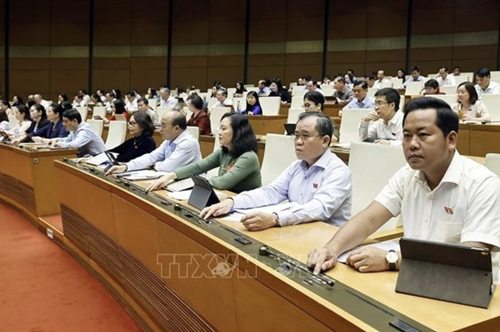The resolution was adopted with 407 out of 423 deputies voting in favor, equivalent to 85.15% of the total N.A. deputies.
    |
 |
|
The resolution receives 407 votes in favor out of 423 deputies, equivalent to 85.15% of the total N.A. lawmakers. |
A summary report from the Supreme People’s Procuracy clarified the principles and scope of application. According to Article 187 of the Civil Procedure Code, responsibility for initiating lawsuits to safeguard the public interests or the civil rights of vulnerable persons typically lies with relevant agencies, organizations, or individuals.
However, in practice, these entities have often failed to act effectively, leaving the public interests and the legitimate rights of vulnerable groups inadequately protected. There have been very few such lawsuits initiated by authorized entities. As a result, the People’s Procuracy proposed and received approval from the relevant authorities to pilot a mechanism enabling it to initiate civil cases where violations have caused harm to vulnerable individuals or to the public interests.
Under this pilot scheme (Article 2 of the draft resolution), the procuracy will only initiate a case if it has already notified or recommended that relevant agencies or individuals pursue legal action, and no such action has been taken. In cases involving vulnerable individuals who are unable to file a lawsuit themselves, or whose legal representatives are unable to do so, the procuracy may step in upon request. If there is evidence that a lack of request is due to coercion, deception, or misunderstanding, the procuracy may also initiate proceedings on its own (Article 14 of the draft).
The role of the People’s Procuracy in these public-interest civil cases has been carefully considered during the policy drafting process and approved by the appropriate authorities. Under the resolution, the procuracy will represent the State in filing civil lawsuits where no other party has taken action to protect vulnerable individuals or the public interest. At the same time, it retains its role as a judicial oversight body under the current civil procedural law.
The dual role, both as plaintiff and as supervising authority, remains consistent with the procuracy’s mandate. It ensures that the State upholds its responsibility to protect the public interests and the civil rights of the vulnerable, while also monitoring legal compliance throughout the legal proceedings. This dual participation is intended to ensure that cases are resolved objectively, accurately, and effectively.
The resolution emphasizes that while parties are generally responsible for providing evidence in civil cases, the People’s Procuracy must actively gather evidence in public-interest cases to support claims made on behalf of vulnerable individuals or the public.
Although courts can investigate during trials, they only assist in evidence collection if litigants have exhausted their efforts. The resolution also stresses the importance of field inspections and expert assessments to establish objective facts in complicated cases, such as environmental damage from industrial pollution.
Source: VNA